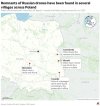What NATO’s Article 4 talks mean after Russian drones entered Polish airspace
Advertisement
Read this article for free:
or
Already have an account? Log in here »
To continue reading, please subscribe:
Monthly Digital Subscription
$0 for the first 4 weeks*
- Enjoy unlimited reading on winnipegfreepress.com
- Read the E-Edition, our digital replica newspaper
- Access News Break, our award-winning app
- Play interactive puzzles
*No charge for 4 weeks then price increases to the regular rate of $19.95 plus GST every four weeks. Offer available to new and qualified returning subscribers only. Cancel any time.
Monthly Digital Subscription
$4.99/week*
- Enjoy unlimited reading on winnipegfreepress.com
- Read the E-Edition, our digital replica newspaper
- Access News Break, our award-winning app
- Play interactive puzzles
*Billed as $19.95 plus GST every four weeks. Cancel any time.
To continue reading, please subscribe:
Add Free Press access to your Brandon Sun subscription for only an additional
$1 for the first 4 weeks*
*Your next subscription payment will increase by $1.00 and you will be charged $16.99 plus GST for four weeks. After four weeks, your payment will increase to $23.99 plus GST every four weeks.
Read unlimited articles for free today:
or
Already have an account? Log in here »
BRUSSELS (AP) — NATO allies swiftly held talks Wednesday on the incursion by multiple Russian drones into Polish — and alliance — airspace and the shooting down of some of the weapons by Polish and Dutch fighter jets.
The consultations at NATO headquarters were part of a regular meeting of ambassadors from the alliance’s 32 member states known as the North Atlantic Council, but Polish Prime Minister Donald Tusk told Parliament that they came under Article 4 of the treaty that founded NATO in 1949 in the aftermath of World War II.
The incident in Poland came three days after Russia’s largest aerial attack on Ukraine since the war began.

Article 4 can put urgent matters on the agenda
Article 4, the shortest of the NATO treaty’s 14 articles, states that: “The Parties will consult together whenever, in the opinion of any of them, the territorial integrity, political independence or security of any of the Parties is threatened.”
Bob Deen, an analyst at the Clingendael think tank in The Hague, said the article is “designed to promote better coordination and understanding within the alliance on external threats. It gives all allies the opportunity to urgently put certain threats or developments on the agenda of the North Atlantic Council.”
Article 4 is
increasingly invoked
Poland previously requested such consultations early in Russia’s war on Ukraine. They do not automatically lead to any action under Article 5 of the treaty, which is NATO’s collective security guarantee, with allies pledging that an attack on one member of the alliance constitutes an attack on all.
“Article 4 gets invoked relatively rarely but increasingly in recent years; Turkey alone invoked it five times between 2003-2020 in the context of Syria and Iraq,” said Deen in emailed comments in response to questions from The Associated Press. “Eight allies invoked it in 2022 shortly after Russia’s full-scale invasion of Ukraine and Poland has triggered it once in 2014 … after Russia’s illegal annexation of Crimea.”
Poland first invoked Article 4 on March 3, 2014, “following increasing tensions in neighboring Ukraine, as a result of Russia’s aggressive actions,” according to the NATO website. And Warsaw joined Bulgaria, Czechia, Estonia, Latvia, Lithuania, Romania and Slovakia in requesting consultations on Feb. 24, 2022, following Russia’s full-scale invasion of Ukraine.
This doesn’t necessarily mean a step toward Article 5
Deen said that Article 4 is related to Article 5, but is “not necessarily a ‘stepping stone.’”
“Article 5 has only been invoked once, in response to the 9/11 attacks on the United States, immediately bypassing article 4. In other words: Article 4 can be invoked without triggering Article 5, and vice versa,” he said.




